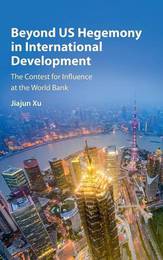
|
Beyond US Hegemony in International Development: The Contest for Influence at the World Bank
Hardback
Main Details
| Title |
Beyond US Hegemony in International Development: The Contest for Influence at the World Bank
|
| Authors and Contributors |
By (author) Jiajun Xu
|
| Physical Properties |
| Format:Hardback | | Pages:322 | | Dimensions(mm): Height 229,Width 152 |
|
| Category/Genre | International economics
Development economics
Political economy |
|---|
| ISBN/Barcode |
9781107172845
|
| Classifications | Dewey:338.9 |
|---|
| Audience | | Professional & Vocational | |
|---|
|
Publishing Details |
| Publisher |
Cambridge University Press
|
| Imprint |
Cambridge University Press
|
| Publication Date |
24 November 2016 |
| Publication Country |
United Kingdom
|
Description
China's initiative to establish the Asian Infrastructure Investment Bank (AIIB), attracting membership from G7 countries against the vocal opposition of the United States, has been recognised as a significant moment in an ongoing hegemonic transition. This book examines how power transitions have played out in the World Bank over the last five decades, offering the first authentic account of the international diplomacy behind donor financing of the World Bank's International Development Association (IDA). Jiajun Xu decodes how the United States amplified its influence at the World Bank despite its flagging financial contributions to IDA. She further demonstrates that the widening influence-to-contribution disparity provoked other donors into taking 'exit/voice' measures, contesting the hegemon's legitimacy. A rising China initially decided to become an IDA donor, seeking influence from within. However, the entrenched hegemonic position of the United States in World Bank governance drove China to initiate the AIIB and New Development Bank, putting competitive pressures on the US-centred multilateral institutions to adapt.
Author Biography
Jiajun Xu is the co-founder (together with Professor Justin Yifu Lin) and Executive Deputy Director of the Centre for New Structural Economics at Peking University, Beijing. Xu worked as a Junior Research Specialist at the United Nations' High Level Panel Secretariat on the Post-2015 Development Agenda responsible for the research on development financing and South-South Cooperation. She also worked as an international consultant on debt sustainability in the World Bank and productive capacity building for least-developed countries at the UNDESA Committee for Development Policy Secretariat. Xu holds a D.Phil. (Ph.D.) from the University of Oxford.
Reviews'Dr Xu, a pioneer of research on Chinas role in global development finance, illuminates with in-depth empirical and institutional knowledge the changing power dynamics of multilateral development banking, a crucial step toward a new multipolar world order.' Helmut Reisen, Universitat Basel, Switzerland, head of ShiftingWealth and former Director of the Organisation for Economic Co-operation and Developemt Center 'Jiajun Xu lifts the veil over the inner struggles among the donor community in funding the World Bank's emblematic aid window through the Cold War and after, and illuminates China's decision to launch new multilateral development finance institutions. A fundamental contribution to understanding the profound transitions in the US-led hegemonic international economic system.' Richard Carey, Chair, International Advisory Committee of the China International Development Research Network and former Director for Development Co-operation, Organisation for Economic Co-operation and Development 'In a dew drop can be seen all the colors of the rainbow', said a philosopher. In Jiajun Xu's book the World Bank and its soft-loan lending arm, the International Development Association (IDA), is the dew drop, and power in the inter-state system and the procedures intended to be the check on self-interested uses of power are the colors. Her analysis of the power-procedures interplay in IDA over decades is relevant across the field of international political economy.' Robert H. Wade, London School of Economics 'This is essential reading for international economists, aid professionals and others interested in how multilateral institutions function. Dr Xu's analysis of what happened in the World Bank can be applied to other institutions in an imperfect, insufficiently adaptable, global system. It explains why China found it necessary to create new institutions to complement its working within the framework of existing ones.' Percy Mistry, Chairman, Oxford International Associates Ltd
|